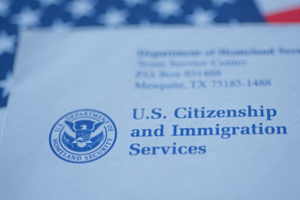USCIS Fee Schedule Changes Expected to Go Into Effect April 1st
By Talia Horrow and Ignacia Rodriguez Kmec
THE TORCH: CONTENTS
March 25, 2024
On January 31, 2024, the U.S. Department of Homeland Security (DHS) published the updated U.S. Citizenship and Immigration Services (USCIS) Fee Schedule. This final rule published in the Federal Register aimed to adjust certain benefit request fees and establish exemptions for specific humanitarian categories. Additionally, DHS responded to public comments offered to the USCIS fee schedule proposal released in January 2023.
Amidst many other members of the public, NILC filed a public comment in response to the January 2023 fee schedule proposal by USCIS but focused on how the proposed changes would affect low-income immigrants, particularly those without lawful immigration status. NILC’s public comment made the following requests: (1) Reduce the cost of applying for or filing for relief for low-income immigrants; (2) Clarify when biometric fees are warranted; (3) Reconsider fee increases for Form I-765 applicants; (4) Reconsider fee increase for family sponsorship; (5) Provide opportunity for more fee exemptions and waivers while expanding the already existing exemptions for U-visa applicants; (6) Allow individual determinations for fee waivers; and (7) Clarify communication regarding payment changes before they go into effect. Thankfully USCIS adopted several of these recommendations.
Five things to know about the rule:
- The new fees are expected to go into effect April 1, 2024. Applications and petitions postmarked on or after April 1, 2024, must include the new fees or USCIS will not accept them. Here is the link to the USCIS fee calculator: https://www.uscis.gov/feecalculator
- There will be a $50 discount if you apply online. The final rule offers a $50 discount for certain forms filed online with the intent of incentivizing online filing. That said, USCIS continues to permit paper filings in order to address the concern of accessibility for low-income immigrants with limited access to a computer and/or the internet to file for relief online.
- The fee to request work authorization is going up. DHS explained that the Form I-765 fee increased, but by less than the originally proposed amount in the proposed rule. Form I-765 currently has a filing fee of $410, which will increases in USCIS’s final rule to $470 when filed online or $520 when filed on paper. For example, the total cost associated with requesting DACA is going up as a result.
- Fee exemptions and fee waivers are available for certain forms. USCIS expanded fee exemptions for various processes including U-visa, T-visa, VAWA, SIJs applications. Additionally, there’s a fee reduction provided for naturalization allowing for payment of half of the regular Form N-400 fee for an applicant with household income at or below 400% of the Federal Poverty Guidelines (FPG) (previously set at 200%). USCIS may grant a fee waiver due to inability to pay or receiving a means tested benefit but added that a means tested benefit to a child can be considered to show parent’s inability to pay. As for individual determinations (e.g. not tied to filing a specific Form), DHS responded by stating that the Director of USCIS can provide exemptions from or waive any fee for a case or specific class of cases if the director determines the action to be in the public interest and the action is consistent with other applicable law.
- Check the USCIS website before filing. USCIS conducts a review every two years of their fees and in the final rule USCIS reserves the right to raise fees due to inflation so we could see additional fee changes before their next review. However, any changes or specifications such as what form edition date to submit, will be on their website. The final rule provides for a 30 day advance public notification requirement before a payment method changes. To avoid delays caused by rejected forms or payments, check the USCIS website before filing.
For more information on the fee rule itself, please see USCIS’s Frequently Asked Questions on the USCIS Fee Rule.
For more information on the effects of the fee rule, please see ILRC’s New USCIS Fee Rule: An Update on USCIS Filing Fees and AILA’s Featured Issue: USCIS Final Rule Adjusting Its Fee Schedule.






